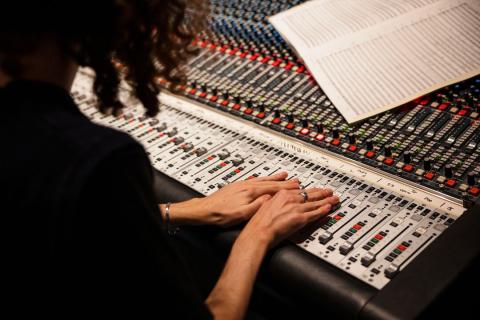Do Producers Need Technical or Musical Skills?

Image by Elizabeth Friar
When one of the world's most famous and successful record producers, Rick Rubin, tells Anderson Cooper that he can "barely" play music and can't navigate a soundboard, a lot of people will start to wonder: What, then, does a producer actually do?
It's the sort of question students come to Berklee every year hoping to answer for themselves. But what the faculty here understand, and what they pass on in class and in the studio, is that there's no one way to be a producer. What works in one session, or with one artist, or for Rick Rubin, doesn't work for everyone. And if you haven't already launched the careers of LL Cool J, Public Enemy, and the Beastie Boys from your dorm room, you might benefit from the Swiss Army knife–style production versatility and critical ear that come with a more formal education in the studio.

Benny Grotto
Image of James Jay Fortin
In light of this recent conversation about what sorts of skills and savvy lead to success as a music producer, we caught up with Boston Music Award–winning producer Benny Grotto, a professor in the Music Production and Engineering Department and co-owner of one of Boston's premier recording facilities, Mad Oak Studios, to ask him about what can and can't be taught about the job, and how his own Berklee education influences his approach in the studio.
In a recent 60 Minutes interview, Rick Rubin said that he doesn’t really know how to play music, that he can’t work a soundboard, and that what he is paid for, as a producer, comes down to a combination of his taste, his confidence, and his ability to express his perspectives to the artists he works with. How does Rubin’s approach to his work square with your own understanding of the job of a producer?
I think if you ask five different producers how to make a record, you'll get twenty-five different answers. There's no "correct" way to produce, and most of us have multiple ways of approaching the task. Artists tend to find producers who work best to fit their needs; if Rick's clients don't need a producer who is also capable as an engineer, then certainly there's never been a need for Rick to learn that craft. Indeed, an argument could be made that he's making a very smart move by hiring the engineering task to more specialized, skillful individuals, freeing himself up to focus on musical concerns.
Let’s take one step back: how do you hear Rubin’s approach to production influence the records he works on?
It seems to me that a key part of Rick's success has been choosing the records he works on. He's covered so much stylistic and sonic ground over the years, but one thing has always remained consistent: the artistic quality of the talent he works with. Whether it's Slayer or Neil Diamond, Rick works with the best. So I guess I'm kinda turning that question around, and considering how the records he works on influence his work.
You’re a formally trained musician—you came to Berklee and studied music production and percussion. How has that training influenced your path as a producer and the kinds of things you’re paying attention to in a studio session? (Or, to be more direct: what are you able to pick up on that Rick Rubin can’t, and does that give you an advantage?)
I can't say what Rick Rubin doesn't pick up, because I've never worked with him! But my background—particularly as a drummer—tends to prejudice me towards the rhythmic. I'm generally paying particular attention to groove and feel, and to a degree (depending on genre or the needs of a particular piece of music), rhythmic accuracy. I suspect Rick—while not a trained percussionist—possesses a keen enough ear that he is capable of the same, when the material demands it. So to that end, I'm not sure there's necessarily an advantage there. That said, with my fluency in music theory, instrumental technique, and so forth, I may be able to more easily communicate modifications of performances or compositions to the musicians I work with, and that perhaps does indeed offer a distinct advantage, at least in terms of providing a more direct path to the desired outcome. This is certainly critical on the more budget-limited projects I work on. So yes, there's an advantage there with regards to my specific line of work. Though I'd hasten to point out that Rick's productions have sold a helluva lot more copies than mine!
Do you see advantages in Rubin’s more feel-based philosophy?
I think the feel-based approach is, frankly, the best approach to making great records. My mentor, the great Sean Slade, certainly prioritized that on every session I ever worked with him, though as an experienced musician himself, he was able to temper that approach with more hands-on and technical input. That's a potent combination, and it's one I think is quite common amongst successful producers.
Are there things a producer can do to preserve or cultivate that sort of intuitive ear even after their brain’s been trained to scan for rhythmic and harmonic structures?
I would hope that such intuition is second-nature, and remains so regardless of a producer's existing training. There's no reason these things can't coexist.
